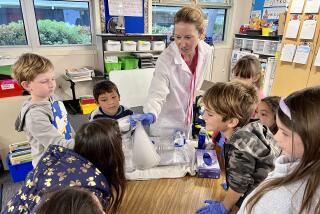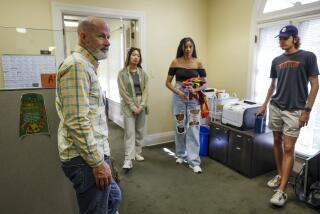Bennett Urges High Schools to Require More Science Courses
- Share via
WASHINGTON — Education Secretary William J. Bennett urged a convention of science teachers Friday to stop apologizing for the difficulty of their courses and start telling students to study harder.
Bennett, departing from his prepared text, also told the National Science Teachers Assn. that “bashing” the Reagan Administration over budget cuts will not solve the problem of scientific illiteracy.
He said every student should be required to take three years of science to obtain a high school diploma. The average student now takes less than two years of science.
Criticism of Bennett
Twelve thousand science teachers are attending the three-day convention here. Bennett spoke at a luncheon a few hours after the association’s executive director, Bill G. Aldridge, criticized Bennett at a news conference.
In particular, Aldridge attacked Bennett’s proposal to fold $91 million in teacher-training programs--now targeted mainly toward math and science teachers--into a revised $80-million program. The plan would funnel grants to states for training teachers in any field and shift $16 million into Bennett’s discretionary fund for training projects.
Bennett told the teachers:
“Let’s stop fooling around. Let’s get three years of science required for every high school graduate and get it done--not pseudo-science, not quasi-science, not ‘Science and Wonderment’ or ‘Science and the Threat of the End of Mankind,’ not ‘Science Isn’t So Hard; Come and See It,’ but science.
‘Stop Apologizing’
“Just . . . say to kids: ‘Some of this is going to be hard, but if you work at it, you’ll get it.’ Stop apologizing for science.”
Aldridge charged that the movement to raise science requirements has driven up the dropout rate nationally. He said the vast majority of students forced into an extra year of science will never take another science course again.
However, Bennett said: “The fear of the difficult is one of the things that is hurting the teaching of science.”
More to Read
Sign up for Essential California
The most important California stories and recommendations in your inbox every morning.
You may occasionally receive promotional content from the Los Angeles Times.













